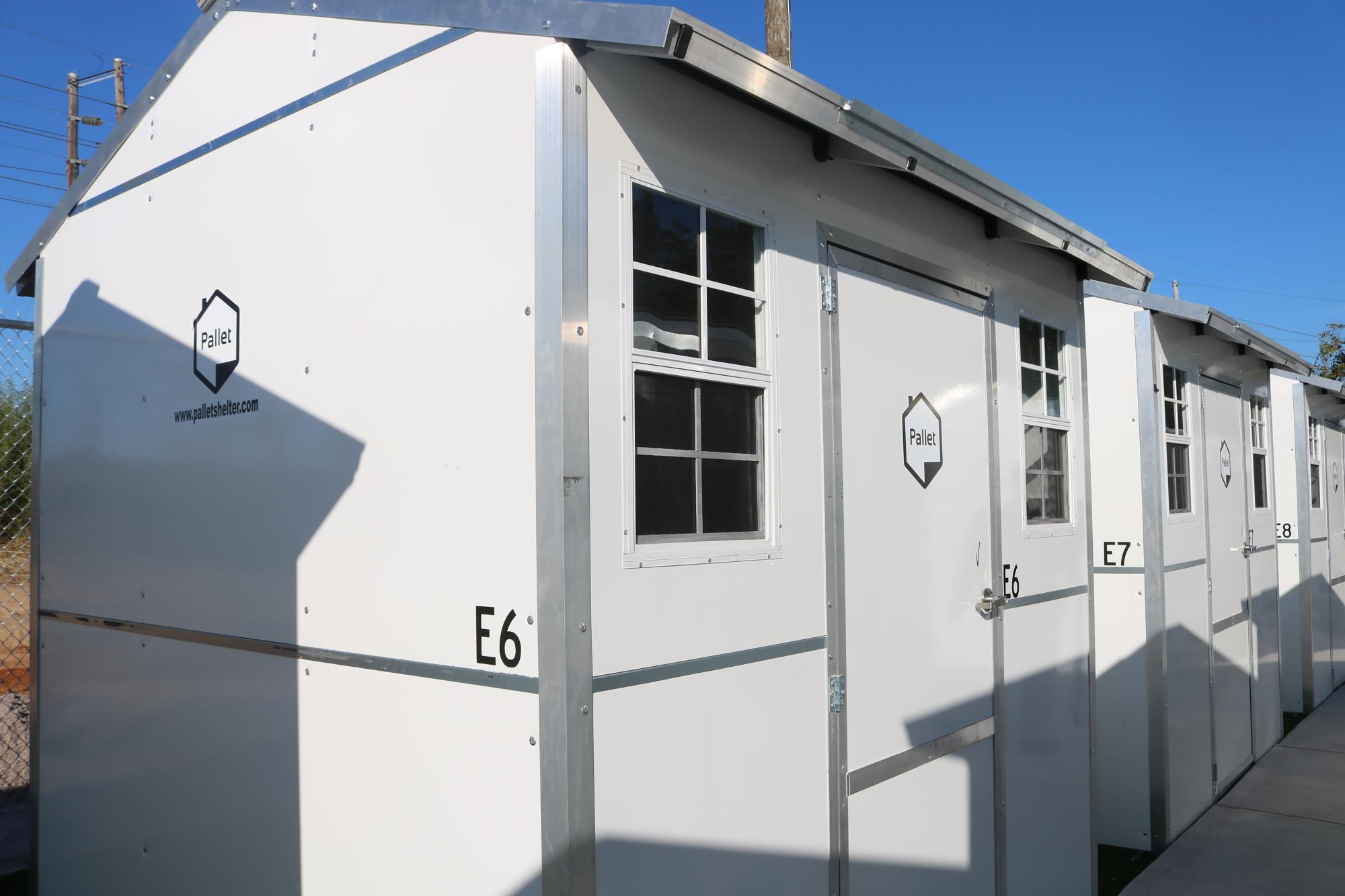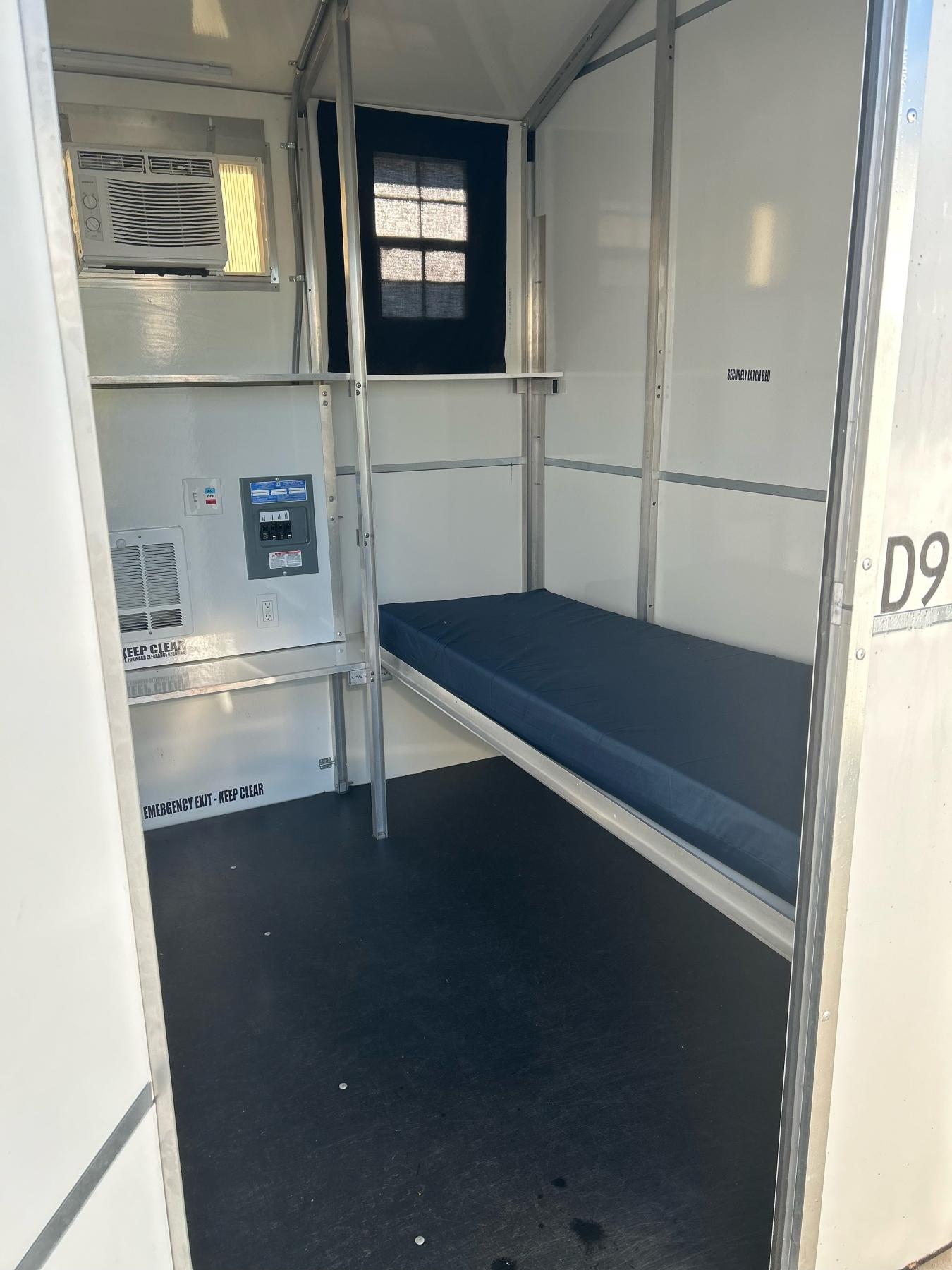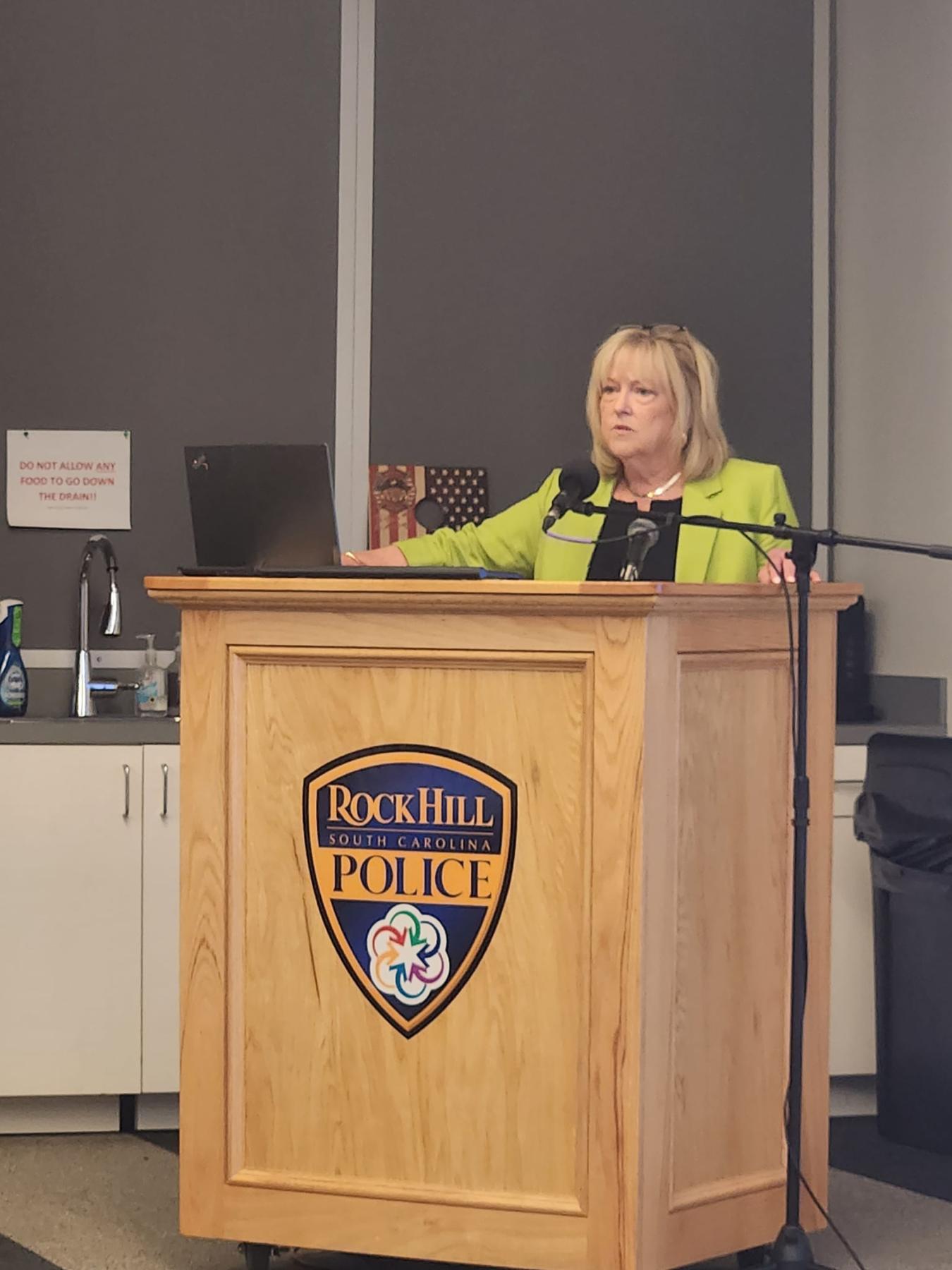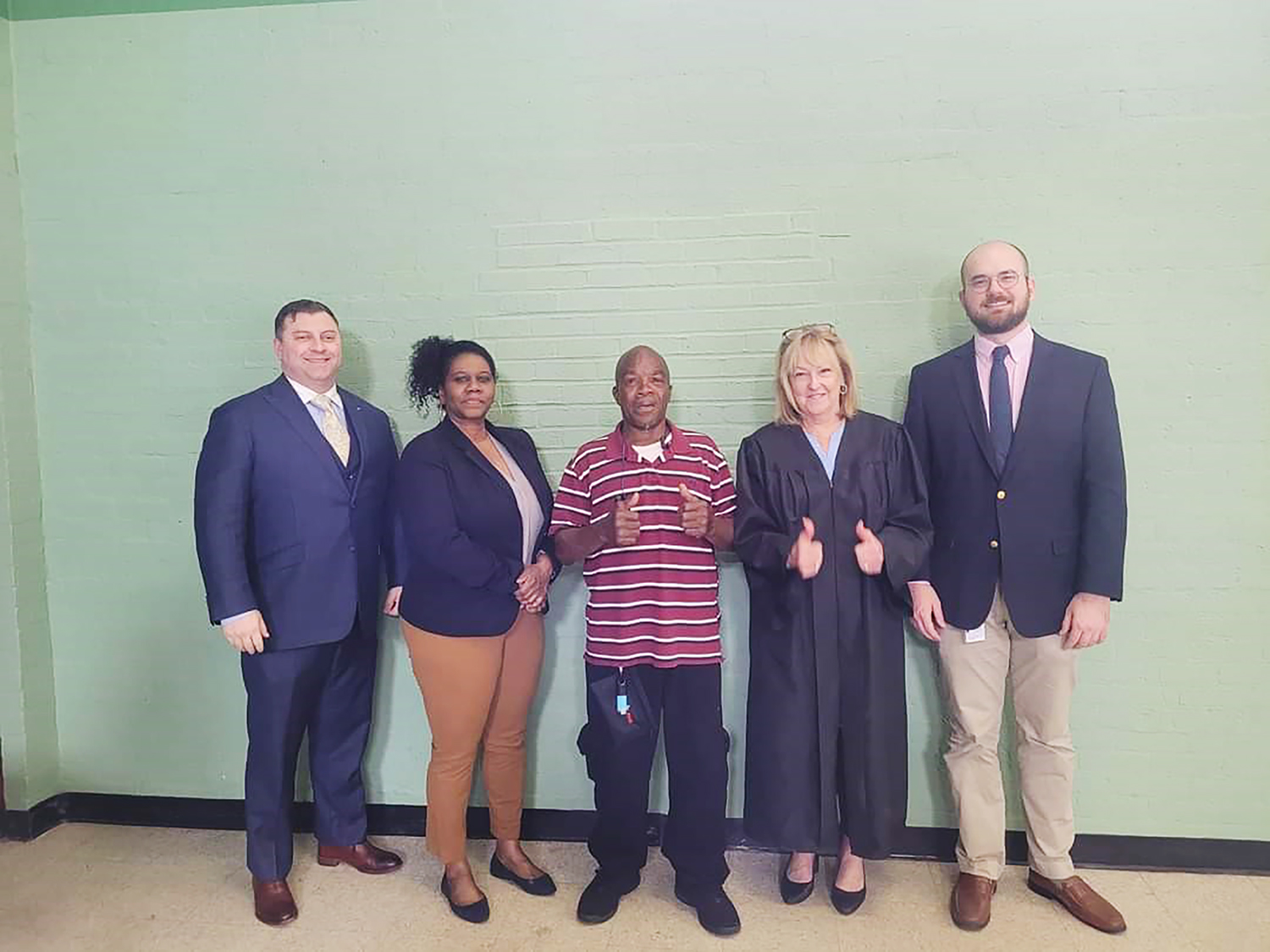From building individual pallet homes to creating courts that work to expunge misdemeanor records of homeless clients, cities around South Carolina are working to find ways to support homeless residents.
In 2021, 13,399 people received homeless services in South Carolina, according to a report from the SC Interagency Council on Homelessness — an 18% increase from the previous year.
Kameisha Heppard, the director of homeless services for the City of Columbia, said increases in the number of people experiencing homelessness spurred the city to act. After researching pallet shelter communities on the West Coast and using recommendations from a council-appointed task force, Columbia decided to create the Rapid Shelter Columbia program, a collection of 50 pallet homes serving as individual shelters for homeless people.


The 64-square-foot pallet homes at Rapid Shelter Columbia include a bed, desk, storage for
belongings and heating and air conditioning. Photos: City of Columbia.
While it typically takes two years to get a program up and running, Columbia had the pallet shelters ready in less than 70 days. When the facility opened in November 2022, it was the first such program in the Southeast.
Each pallet is 64 square feet. It includes a bed, a heating and air conditioning unit, a desk and an area for the residents’ personal belongings. There are 40 pallets for men and 10 for women, and clients can stay in them 90 days.
“Rapid Shelter Columbia is for individuals who are chronically unsheltered,” Heppard said.
“They are for individuals who have been homeless 12 consecutive months, or have had four episodes of homelessness in three years. Those are the qualifications to be eligible to get a pallet.”
The program is referral-based, meaning clients are recommended for the shelter by social workers from the SC Department of Social Services, the Richland Library and other agencies. They go through a screening process to determine if they meet the qualifications. Once they are accepted, they are assigned to a case manager who helps them access services.
The program, Heppard said, is “doing what it’s supposed to do. It eliminates the congregant setting that some individuals cannot thrive in, and allows them to have their own space.”
The program is funded through the city’s general fund, supplemented with a portion of Columbia’s American Rescue Plan Act funds. There were 577 referrals in the first year, with 217 people admitted to the pallet shelters.
As with Columbia’s Rapid Shelter program, the Rock Hill Homeless Court found its inspiration in programs proven to work elsewhere. In 2019, an article from SC Lawyer magazine about homeless courts came across Rock Hill Municipal Judge Jane Modla’s desk. She was intrigued.
“I knew we had homeless people and we had a place called Pathways that is a one-stop shop for the homeless,” she said. “I said, ‘I’m the city judge; maybe I should do something,’” Modla said.

Rock Hill Municipal Court Judge Jane Modla helped establish the Rock Hill Homeless Court.
Photo: City of Rock Hill.
Homeless courts, which began on the West Coast and have spread throughout the country, were created to help expunge misdemeanor charges, fines and bench warrants on homeless people’s records so they would be more likely to secure housing. There are seven homeless courts now operating in South Carolina.
Modla spoke with an attorney from Columbia’s Nelson Mullins law firm, which had taken on establishing homeless courts pro bono, and met with Rock Hill’s public defender and solicitor before visiting Columbia’s homeless court.
“I told the mayor and city council, ‘I have a proposition. It’s free and easy,’” she said.
She saw it as just another session of court — two hours a month of her time — and she would take the court to the homeless residents to help with their potential fear of court sessions. Sessions would take place on the fourth Thursday of the month at Pathways.
The charges can’t be violent crimes, felonies or drunk-driving charges. Participants must be seeking help through a program and working toward acquiring housing. A service provider makes the application to the court on the person’s behalf.
“We follow them through for four months or so to keep up with how they are doing,” Modla said. “If they graduate, we take the charges off their record.”
The court handles only misdemeanors within the city limits, with some people having charges that go back 30 years and more, a time when simple possession of marijuana could be a felony.

From left: Public Defender Jeremy Hayes; Public Defender Deondra Sexton; Curtis Gordon, the
first graduate of the Rock Hill Homeless Court program; Rock Hill Municipal Court Judge
Jane Modla; and Assistant Solicitor Shannen Deeter. Photo: City of Rock Hill.
“They have charges that shouldn’t be on their rap sheets. They have non-convictions that didn’t get expunged and should be,” she said.
SC Legal Services, which provides free legal assistance in a variety of non-criminal matters to low-income South Carolinians, can help with areas such as disability claims, Social Security cards and other services.
The court’s first session came in March 2023. In a little over a year, the court had 65 referrals, 35 acceptances into homeless court and 17 graduates. Modla said the court has been successful because of community support, including from social workers, service providers that run the shelters, staff in mental health and substance abuse centers, the circuit solicitors and legal aid.
“We are not building houses. This is not magic,” she said. “But this is one thing the legal community can do. We are trying to help where it hurts. And the legal community is willing to do it.”
In Charleston, there are several programs offering help to homeless populations, including the Hope Center, a day resource center providing services to unsheltered and vulnerable people.
Hope Center services include respite from the hot or cold weather, access to laundry facilities, bathrooms, clean clothing and mobile phones. Counseling comes from a peer support specialist, licensed substance abuse counselor, a social worker and an outreach team, said Geona Shaw Johnson, Charleston’s director of housing.
“The City of Charleston created the Hope Center in response to the need to address an increase of persons in the community that were considered chronically homeless, meaning living on the streets or in places not meant for human habitation for two or more years, and to minimize the increase of the vulnerable to ensure they could maintain housing and other services,” she said.
In the first two years of the program, approximately 2,500 people have been helped through various services at the center.
The mayors of Charleston and surrounding municipalities also have worked to establish the Lowcountry Rapid Housing Program, which provides an immediate, low-barrier shelter to at least 120 people.
The program works “in concert with the clients to secure wrap-around services to assist them in locating permanent housing and to address the challenges that caused homelessness,” Johnson said. “Because homelessness knows no boundaries and an effective approach is a regional approach, Mayor [William] Cogswell has met with the mayors across the community to discuss and implement a strategy that addresses this matter.”
The City of Charleston also supports Neighbors Together, a local nonprofit that is starting a pilot project “Gateway to Housing,” incentivizing landlords to rent to people transitioning out of homelessness. Landlords will receive rental deposits on behalf of the tenant and a maintenance fee for repairs to the apartment should any damage occur, she said.
Johnson offers this advice for cities working to support homeless populations: “Recognize that homelessness is a multi-tiered challenge, and it requires a multi-tiered approach, with funding and committed, collaborative organizations with the appropriate skills and experience who can provide persons who have and are experiencing homelessness an opportunity for a better life.”
